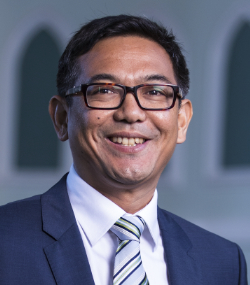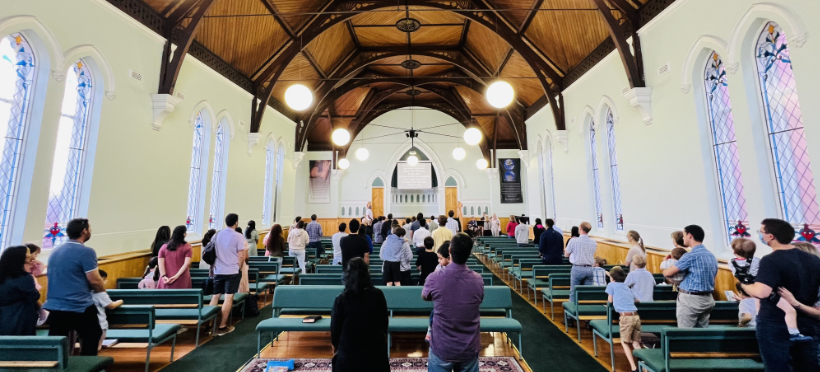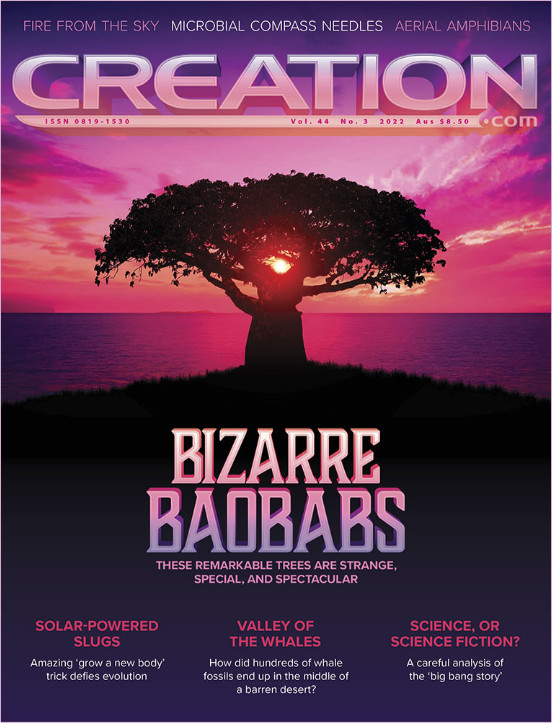From Cambridge chemist to passionate pastor
Mark Harwood talks with Dr Michael Prodigalidad about his fascinating journey from science to the pulpit

I first met Michael Prodigalidad in 2013, at the inner-city church in Sydney where he is the pastor. He had made its excellent facilities available for a Proclaiming Creation Conference (a one-day event with visiting CMI speakers). In our brief moments of conversation, snatched between conference activities, I was fascinated to learn that he had a Ph.D. degree in chemistry from the prestigious Cambridge University in England. Cambridge staff and alumni have won over 120 Nobel prizes.
So, what can take a brilliant scientist on a journey to being the pastor of a vibrant inner-city church?
Michael explains:
I was born in the Philippines and grew up in a religious environment. But I hadn’t heard the Gospel of salvation through faith in Jesus until I was a university student in Australia. I had met some Christians in my first year of study, was intrigued by their faith, so went along to visit their evangelical church. This is where God saved me and I became a born-again Christian. I was studying chemistry, but my university colleagues were not particularly interested in matters of faith. And, at my church, creation was considered a secondary doctrine, and therefore not important. So, I began my Christian walk without understanding Genesis as actual history.

After his undergraduate degree, Michael won an industry scholarship to pursue postgraduate studies at Cambridge University. There, he attended a debate between a biblical (young earth) creationist and a theistic evolutionist who believed God used evolution to create. This provoked him to dig deeper as he came to understand the influence of prior belief on the interpretation of evidence. Which was true—creation or evolution? He needed an answer. Michael continued:
I realized that the God who inspired the writing of the New Testament also inspired the writing of the Old Testament. If I believed the Gospel accounts of the life, death, and Resurrection of Jesus, I concluded that the Genesis account of creation must likewise be the one true authoritative record. It must therefore be historically true. It follows that we can’t cherry-pick which parts of the Bible we want to believe.
With a broad smile, he added: “God has not given us a ‘cut and paste’ version of the Bible.”
The amazing machinery of life
At this time, his research at Cambridge was in serine phosphorylation, whereby a phosphoryl group (PO32-) is attached to serine, one of the amino acids that are building blocks of proteins. This is an important process by which cells modify protein structure and activity. Michael’s task was to develop chemical tools in a laboratory to better understand this vital biological process. To do this required considerable intelligence and careful experimental design by an external agent. All this to make a simple chemical bond! The cells in our bodies do this millions of times per second and it is essential for life.
“The more I studied biochemical pathways, the more I was in awe of them. It was impossible to see such complexity as a product of random chance”, said Michael. And since many are essential for self-reproducing life, they could not be the result of natural selection either, because this presupposes reproduction. Sometimes people say that science and Christianity don’t mix, but Michael believes: “Good science should honour God our Creator. It should promote wonder, amazement, and praise.”
Interestingly, the sign over the entrance to the famous Cavendish Laboratories at Cambridge says, “The works of the Lord are great; sought out of all them that have pleasure therein.” These words are Miles Coverdale’s 1535 translation of Psalm 111:2 (with modern spelling). In 1973, a Christian Ph.D. student, Andrew Briggs (now Professor of Nanomaterials at Oxford), succeeded in persuading the university (to his surprise) to install the sign. This verse in Latin adorned the original building at the instigation of the great scientist and creationist James Clerk Maxwell (1831–1879), the first Cavendish professor.
A creationist at Cambridge
I asked Michael how his biblical creation views had been regarded by his colleagues at Cambridge. He replied:
There were a variety of responses. Some objected, some were curious, and others were supportive. There were many discussions, often leading to positive opportunities to share the Gospel. At other times, discussion and debate generated more heat than light. I am reminded of the scriptural instruction to young men to exercise self-control in such situations (Titus 2:6), and yet also to be prepared to give an answer with gentleness and respect (1 Peter 3:15). Overall, God was kind and graciously provided people who encouraged me and sharpened my thinking.
I asked whether biblical creation strengthened his faith. Michael pointed out:
If we don’t exercise faith, it can become weak and of limited use, just like unused muscles. Conversely, if we exercise our faith regularly, it is strengthened. I would often remark at the beauty of God’s creation, give thanks for His amazing design or ask some ‘curious’ questions. Sooner or later, people will ask a question or two in response. If you don’t know how to respond to a particular challenge, take the question on notice. And then research the answer; creation.com is a great place to start! These small conversations and exchanges can strengthen your faith by deepening your understanding of science and God’s Word.
After completing his doctoral degree, Michael returned to Australia and moved into the business side of medical research. This included the commercialization of research developed within the faculty of medicine at Sydney University, and business development for the Garvan Institute of Medical Research. During this time, he also completed a master’s degree in business administration.
Why the switch?

With such a high-powered career, I wondered what it was that led Michael to his present role as pastor at an inner-city church in Sydney.
He explained:
On returning to Australia from Cambridge in 2000, I looked for a church that was Bible-based, which, importantly, meant it believed in creation. And I found that at Stanmore Baptist. Several years after I joined the church I was appointed an elder, and in 2010 was called to serve full time as pastor. As much as I loved working on developing new diagnostics and therapies, I knew that our deepest human need was met in Jesus Christ. So I wanted to focus on sharing the good news with others.
Drawing a parallel with Romans 1:21–22, Michael went on to refer to the spiritual darkness of inner Sydney, typical of so many wealthy Western communities:
The area is affluent, educated and seemingly self-sufficient. Together, this can lead to indifference and animosity towards the Gospel, but also a sense of hopelessness. In a recent census, this part of Sydney was in the top percentile of people who indicated ‘No religion’. Interestingly, this same area has been rated as among the unhappiest in Australia!1
But Michael’s face lights up when he speaks of his obvious passion for the Lord and the truth and authority of His Word. The Gospel needs to be presented truthfully and without compromise but graciously and mercifully. “With such darkness and hopelessness, there are great opportunities to share the good news of Jesus Christ. The Gospel will be made more visible if we are salt and light in the world,” he said.
Science and the Bible
The value of understanding the role of science with respect to the Scriptures is a vital part of Michael’s ministry. Our culture can often worship science, called scientism. But, as Michael pointed out, even though medical textbooks do not affirm the Resurrection, that doesn’t mean Jesus didn’t rise from the grave.

Science is about studying how the universe works through observable, repeatable experiments, but cannot reveal the origin of the universe. For that, we need the eyewitness account provided for us in the opening chapters of Genesis, he said. Trying to combine the atheistic worldview of evolution with the Scriptures inevitably makes death the mechanism for the development of living things, which misrepresents the character of God. But death came through Adam’s sin, as Genesis 3 clearly tells us—and is “the last enemy” (1 Corinthians 15:26). During the Creation Week, God called what He had created “good” six times, and then on the sixth day He called it all “very good”. This cannot be reconciled with a world full of death and suffering as it is now. The reason Jesus came was to pay the price of man’s sin, which is death, so that all who believe could go free.
I asked Michael if he had any advice and encouragement for students. He replied:
Know the place of science and its limitations. Science is a useful tool but a useless Lord and Saviour.
Don’t reject the common grace of science which is used for the betterment of society. That said, science can’t determine what is good or evil.
Be firmly convinced of the inerrancy of Scripture (2 Timothy 3:16). Know Sola Scriptura (Scripture alone as the highest authority for all of life) and Tota Scriptura (all Scripture is to be taught, believed, and applied). Study the Bible with greater diligence and enthusiasm than your course material, for in Scripture are the words of eternal life.
Join a local Bible-believing church that is unashamed of the Word of God—including Genesis 1–11. Ask hard questions, encourage your pastor to teach deeply. Iron sharpens iron as Proverbs 27:17 says.
It is indeed encouraging to see a person with such impeccable scientific and business qualifications and experience standing firmly and confidently on God’s inerrant Word!
References and notes
- Horin, A., Welcome to the angst-ridden inner west, Sydney Morning Herald, 13 Feb 2006. Return to text.







Readers’ comments
Comments are automatically closed 14 days after publication.